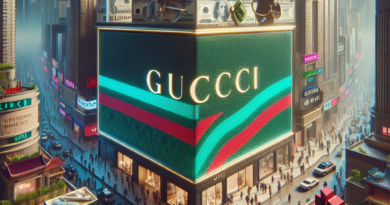Luxury suffers with Gucci's sales collapse. Is the reason China?
Luxury in the spotlight today: Kering shares plummet, with a loss of over 13% at the time of writing.
It is set to be the worst day on record after the French luxury goods company warned that first-quarter sales of its flagship brand Gucci would fall by around 20% due to weakness in Asia.
Kering stock fell by around 15% in the first trading sessions, wiping around 7.9 billion euros from its market capitalization and dragging down the share prices of other major luxury goods companies such as LVMH and Hermes.
In general, European stock markets were weighed down by the collapse of luxury stocks which wiped out more than $30 billion from their market value.
The Chinese market is at the center of the sector's attention.
Can the dragon crisis affect the big luxury brands? Luxury plunge, crisis warning from Gucci Kering shares plummeted after the French luxury group warned that sales of Gucci, its biggest brand, fell by about 20% in the first quarter.
The slump in sales at Gucci – more dependent on China than some luxury rivals – was due to a steeper-than-expected decline in the Asia-Pacific region.
The fashion group has tried to revitalize the Italian brand which accounts for around two-thirds of profits, without success.
The warning is likely to spark fresh speculation about how Kering might reduce its dependence on the faltering brand whose fortunes have fluctuated sharply over the years in response to changing tastes.
Kering expects group sales to decline by around 10% for the first three months of the year, significantly worse than consensus expectations for a 3% decline.
“Gucci has been experiencing some company-specific issues for a few quarters, but this update will raise additional concerns about the state of consumer spending and the Chinese economy,” analysts at Vital Knowledge wrote in a note to clients.
Luxury fears China: what can happen? Beyond Kering's challenges, analysts flagged the upgrade as a potential drag on the luxury sector, and Citi called it "a rather worrying sign." Expectations of a strong recovery in China have been dashed by a slowing economy, a debt crisis in the key real estate sector and high youth unemployment.
The luxury sector “is beginning to reveal fractures, particularly evident in the case of Kering.
The factor behind these developments is the uncertain state of the Chinese consumer,” said Florian Ielpo, head of macro research at Lombard Odier Asset Management.
Consultancy firm Bain forecasts mid-single-digit growth for China's luxury market this year, following a 12% increase in 2023.
Analysts have noted divergent fortunes for high-end fashion brands as the sector's growth slowing, with brands targeting very high-end customers, such as Hermes and LVMH, outperforming smaller rivals such as Burberry.
The British label, which is undergoing a brand restructuring, issued a profit warning in January.
Barclays expects growth at high-end luxury companies this year to be around 5%, down from nearly 9% last year as younger consumers become more frugal in the face of rising costs.



